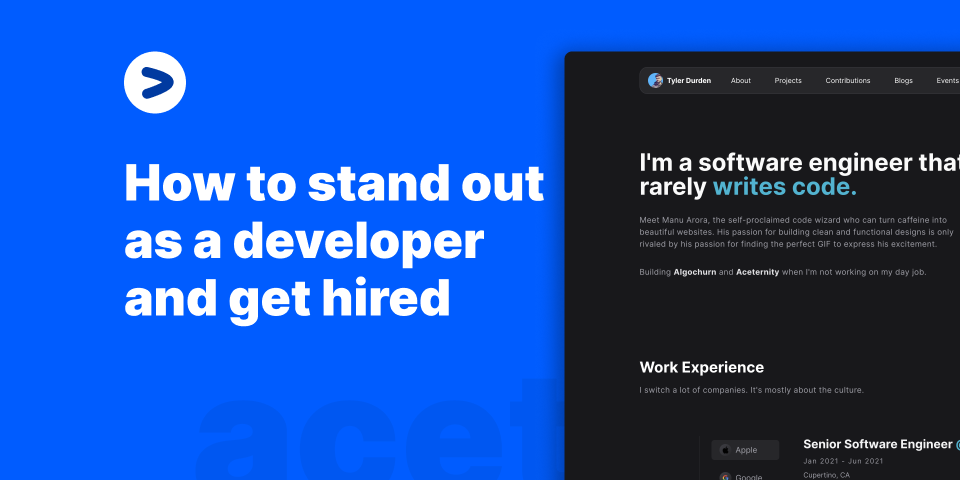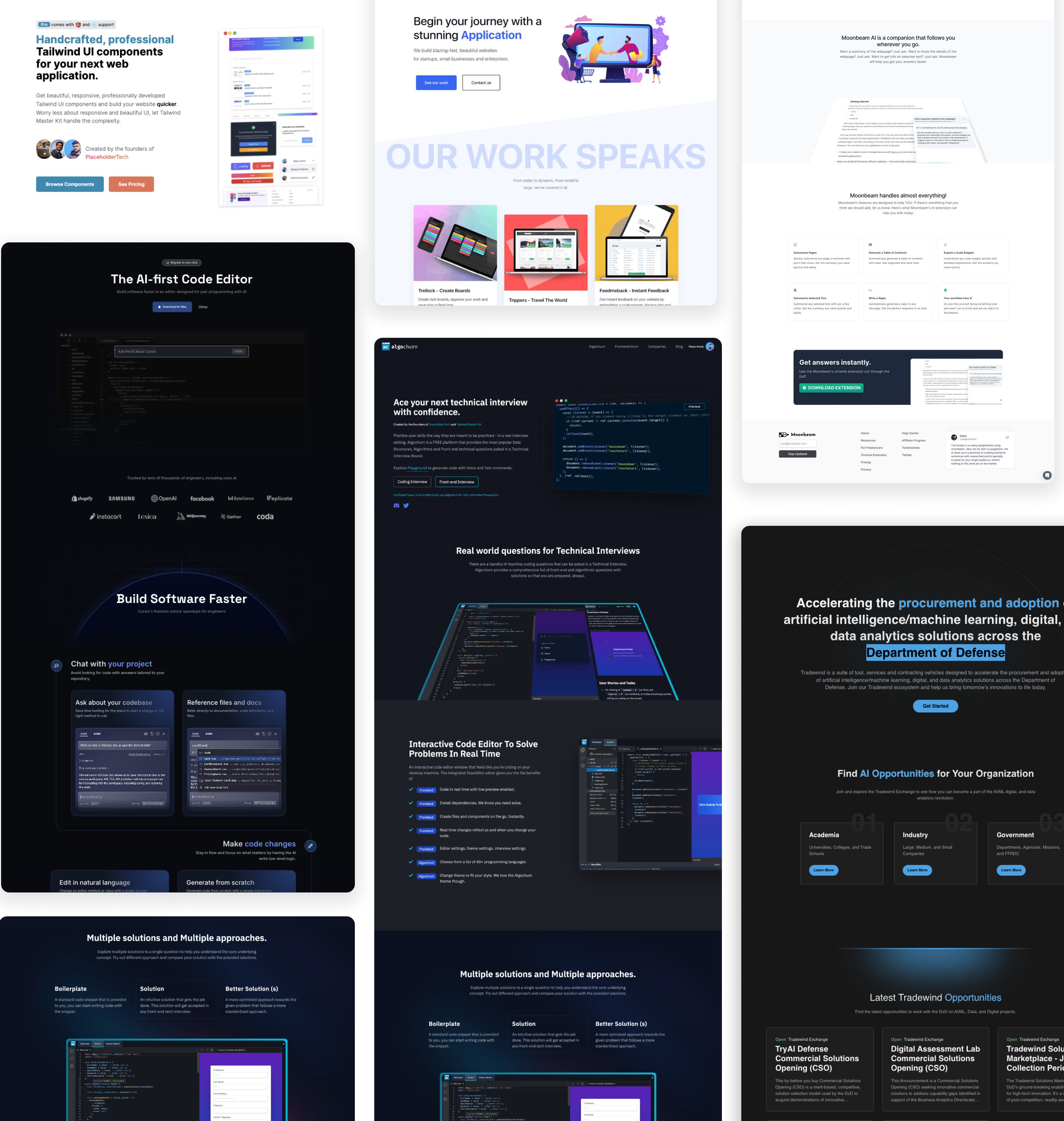
How to stand out as a developer and get hired
As a developer, standing out amongst the competition is essential if you are looking to gain employment. Having an impressive portfolio website, leveraging social media, creating a professional LinkedIn profile, and writing blog posts are all ways to increase your visibility and make yourself more attractive to potential employers.
This blog will discuss the benefits of standing out as a developer and provide tips for building a portfolio website, leveraging social media, creating a professional LinkedIn profile, and writing blog posts.
Introduction
The term "standing out" can be defined as being recognized or noticed in a positive light. As a developer, standing out means having an online presence that showcases your skills, experience, and achievements in a way that sets you apart from other developers.
This is significant because it increases the chances of being noticed by employers who are looking to hire developers with specific qualifications and experiences.
Some of the benefits of standing out as a developer include increased visibility, improved networking opportunities, and enhanced reputation. Having an online presence allows potential employers to easily find you and review your qualifications.
Leveraging social media provides the opportunity to expand your network and connect with other professionals in the industry. Writing blog posts can also help to build your reputation as an expert in your field and demonstrate your knowledge of the latest trends and technologies.
In this blog, we will discuss how to stand out as a developer and get hired by establishing an online portfolio website, leveraging social media platforms, creating a professional LinkedIn profile, and writing blog posts.
Establishing a Portfolio Website

Having an online portfolio website is essential for standing out as a developer. It serves as a platform to showcase your skills, experience, and achievements in a professional manner. Some of the benefits of having an online presence include increased visibility, improved networking opportunities, and enhanced reputation.
Potential employers will be able to find you easily through search engines such as Google or Bing and review your qualifications. Additionally, having an online portfolio website provides the opportunity to connect with other professionals in the industry through social media or other online platforms. Finally, having an online presence helps to build your reputation as an expert in your field by demonstrating your knowledge of the latest trends and technologies.
When building an online portfolio website, there are several tips to keep in mind:
- Choose a domain name that reflects your brand.
- Choose a hosting provider that meets your needs.
- Utilize a content management system (CMS) to create a professional website.
- Optimize your website for mobile devices.
- Make sure the website is secure by using HTTPS protocol.
- Utilize search engine optimization (SEO) techniques to ensure visibility.
By following these tips, you will be able to create an appealing and professional website that stands out from the competition.
Ideally, your portfolio website should have the following sections:
- Home page: Get as creative as you can be and position yourself in the best position to win. Recruiters look at a lot of websites, what makes yours stand out? Is it the design? the content? or both?
- About page: Keep it short and to the point, try conveying a story.
- Portfolio: The meaty part of your website. Showcase your projects. Make sure to include a description of the project, the technologies used, and a link to the source code. If possible, host all your projects.
- GitHub repos: A way for the recruiter to look at your code.
- Contact information: A contact page can work wonders. Keep it short, recruiters are not going to fill a full blown form. A simple chat widget can work. Make sure to include your email address and phone number.
What can make your website stand out?
- Snippets section: Share code snippets that are otherwise difficult to pull off. For example, a snippet that shows how to use a specific API. A website should be your very own digital playground. Your space on the internet.
- Resources: Share helpful resources that you've used and can vouch for.
- A dashboard that shows your spotify / Github activities. I'm just thinking out loud here. :D
Built the website with the technology that you actually like and want to pursue a career in. If you're a React developer, don't build your website with Angular. If you're a Node developer, don't build your website with PHP. If you're a Python developer, don't build your website with Ruby.
I created DevPro template. It is:
- The most advanced and customizable template for developers.
- It is built with Next.js, Tailwind CSS, and TypeScript.
- It is fully responsive and optimized for mobile devices.
- It is also SEO friendly and comes with a dark mode.
Go check it out and I'm sure you'll love it. 🔥
Leveraging Social Media
Social media platforms such as Twitter, LinkedIn, and Instagram offer great opportunities for developers to connect with potential employers and expand their network. Having an engaging presence on these platforms can help to increase visibility and attract potential employers.
Some of the benefits of leveraging social media include increased exposure, improved networking opportunities, and enhanced reputation. Being active on social media allows you to reach a wider audience and build relationships with other professionals in the industry. Additionally, engaging with other users on the platform provides the opportunity to demonstrate your knowledge of current trends and technologies.
When building an engaging presence on social media, there are several tips to keep in mind:
- Create a consistent brand identity across all platforms.
- Engage with other users on the platform and build relationships.
- Post regularly, but be mindful of quality over quantity.
- Monitor analytics to determine which content resonates with your audience.
By following these tips, you will be able to build an engaging presence on social media that stands out from the competition.
Creating a Professional LinkedIn Profile
Having a professional LinkedIn profile is important for standing out as a developer. It serves as a platform for potential employers to learn about your skills and experience in order to determine if you are qualified for the position they are looking to fill.
Some of the benefits of having a professional profile include increased visibility, improved networking opportunities, and enhanced reputation. Your profile provides potential employers with insight into your skillset and experience which makes it easier for them to determine if you are qualified for the position they are looking to fill. Additionally, having a professional profile allows you to connect with recruiters and hiring managers in your industry which can help open doors for potential job opportunities.
When building a professional LinkedIn profile, there are several tips to keep in mind:
- Use keywords that employers are looking for in your profile summary and headline.
- Showcase your skills and experience through relevant work examples.
- Ask for professional recommendations from colleagues, managers, and mentors.
- Connect with recruiters and hiring managers in your industry.
By following these tips, you will be able to create a professional profile that stands out from the competition.
Writing Blogs
Writing blog posts is another way for developers to stand out from the competition by demonstrating their expertise in their field of work. Blogging provides an effective platform for expressing ideas or opinions on topics related to development which can help attract potential employers who are looking for qualified candidates with specific skillsets or experience levels.
Some of the benefits of writing blogs include increased visibility, improved networking opportunities, and enhanced reputation. By writing interesting and engaging blog posts on topics relevant to development, you can attract potential employers who may be interested in hiring you based on your knowledge or experience level. Additionally, blogging allows you to connect with other professionals in the industry who may be interested in collaborating or providing advice on projects or job opportunities.
When writing blog posts, there are several tips to keep in mind:
- Choose topics that would be of interest to employers.
- Research thoroughly before writing to ensure accuracy.
- Break up the blog into sections or subsections for easier readability.
- Utilize graphics, images, and videos to enhance your blog posts.
By following these tips, you will be able to create interesting and engaging blog posts that stand out from the competition.
Conclusion
In conclusion, standing out as a developer is essential if you are looking to gain employment as it increases visibility amongst potential employers who may be interested in hiring you based on your skillset or experience level.
Establishing an online portfolio website allows potential employers to review your qualifications easily while leveraging social media offers great opportunities for connecting with other professionals in the industry or expanding your network.
Creating a professional LinkedIn profile helps potential employers gain insight into your skillset while writing blog posts can help demonstrate your knowledge of current trends or technologies related to development which can attract potential employers who may be interested in hiring you based on these factors alone.
Finally, some words of advice would be to take advantage of all available resources when it comes to standing out as a developer such as utilizing search engine optimization techniques on portfolio websites or engaging with other users on social media platforms in order to increase visibility amongst potential employers which could lead to job opportunities down the line!
posted by Manu Arora










